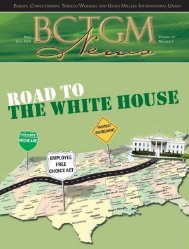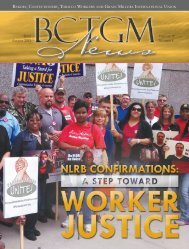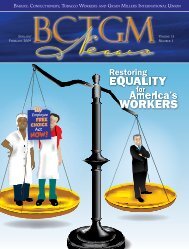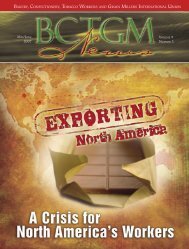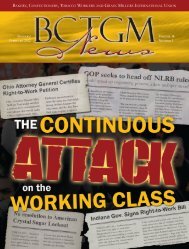to download a printable PDF - BCTGM
to download a printable PDF - BCTGM
to download a printable PDF - BCTGM
- No tags were found...
You also want an ePaper? Increase the reach of your titles
YUMPU automatically turns print PDFs into web optimized ePapers that Google loves.
YOUNG WORKERSWHAT’S ON OUR POLICY AGENDA?Workers under the age of 34 face higherunemployment rates than olderworkers and make up nearly half of the currentlyunemployed. As student debt continues <strong>to</strong> buildup – exceeding even credit card debt – and wagesstagnate or fall for workers with or without acollege degree, young workers are accruing lesswealth than their parents, perhaps the first timein U.S. his<strong>to</strong>ry when a generation has failed <strong>to</strong> dobetter than its parents.On May 8, the AFL-CIO Next Up program, inpartnership with Campus Progress, GenerationalAlliance, the Young Invincibles, the RooseveltInstitute Campus Network and Jobs with Justice,hosted the National Youth Economic PolicyForum. This event was the first of its kind: Youngworkers and youth activists gathered at AFL-CIOheadquarters in Washing<strong>to</strong>n, D.C., <strong>to</strong> discussthe state of the economy and begin the processof building an economic policy platform for themillennial generation.Matthew Clark of the <strong>BCTGM</strong> InternationalResearch & Education Department was among theparticipants <strong>to</strong> help tackle the question: What isthe economic policy of young workers?Participants engaged in in-depth conversationson education access and student debt, economicinequality, job creation and youth unemployment,the federal budget and building a modernworkplace. They were joined by Rep. Keith Ellison(DFL-Minn.); state Rep. Kevin Killer (D-S.D.); PortiaWu, White House Domestic Policy council memberand special assistant <strong>to</strong> the president for Labor andWorkforce Policy; and AFL-CIO Executive Secretary-Treasurer Elizabeth Shuler for a panel discussion andQ&A on building a sustainable economy.The day concluded with a rundown of eachgroup’s discussion. The common theme was a need<strong>to</strong> support young workers and the unemployedby coming <strong>to</strong> terms with the fact that the youngergeneration is unique, not only in the economicsituation they face, but in how they think of their roleboth in the workforce and the policy process.There are a number of ways that millennialsdiffer from their generational counterparts, andthe AFL-CIO’s new youth policy platform hopes<strong>to</strong> address them all and find ways <strong>to</strong> support andenhance the rights of young workers.“The event went better than I could haveimagined,” said Sarah Lewis, AFL-CIO researcher andthe powerhouse behind the forum. “Yesterday wasthe first time that labor had deliberately partneredwith youth organizations <strong>to</strong> discuss the issues ofour day. Though some may argue that unions aren’trelevant <strong>to</strong> young people anymore, we know that’snot true. Work connects us all. This will hopefullybe the first of many events for the AFL-CIO and ouryouth community organization partners.”Participants <strong>to</strong> the AFL-CIO’s National Youth Economic Policy Forum (Pho<strong>to</strong> by Joseph Kekeris)10 <strong>BCTGM</strong> News



